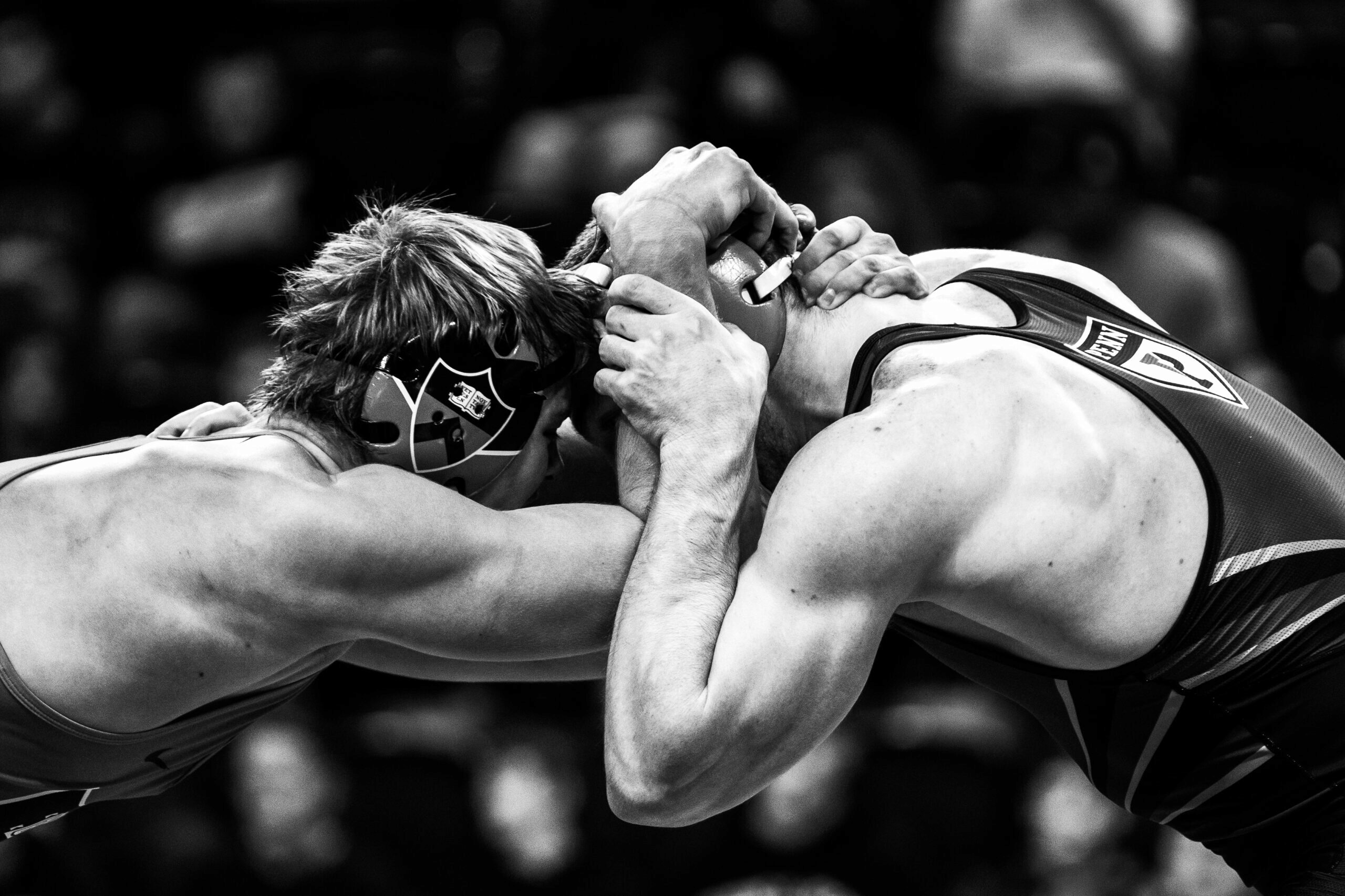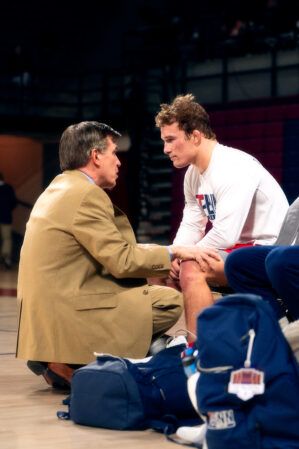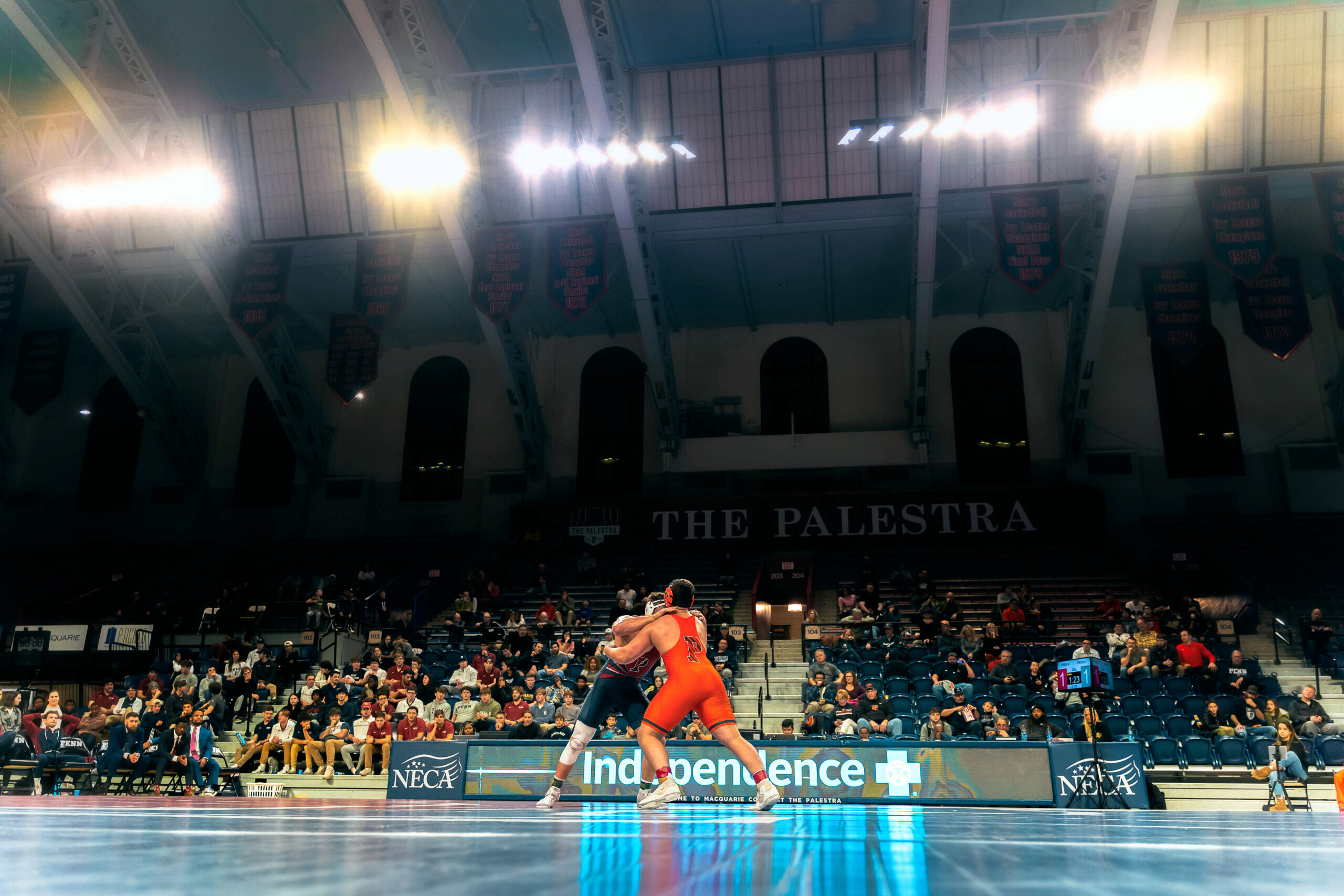Penn Wrestling Partners with Wharton Neuroscience Initiative to Win Mind Games
A collegiate wrestling match is only seven minutes, but that can feel like forever for an athlete pushing both his brain and body to the limit for a win.
The University of Pennsylvania Quakers are learning how to make every minute on the mat count, thanks to a unique collaboration with the Wharton Neuroscience Initiative (WiN). They recently completed a project using patented biometric sensors that captured a wealth of data on the physical and mental performance of the wrestlers as they fatigued — and results are helping the 24th-ranked team take down the competition.
Wharton professor Michael Platt, who holds appointments in the departments of marketing, neuroscience, and psychology, led the research that found an undeniably strong correlation between fatigue and good decision-making. As athletes tire, they make more mistakes and errors in judgment because they begin rushing through their reasoning to get to the end of the match. It’s known in neuroscience terms as the speed-accuracy trade-off, and Platt says it’s a “bedrock feature” of cognitive brain function.

“If you want to make a really good decision, you need to slow down. But it’s really hard to do that in high-stress, high-performance settings,” said Platt, who described how they monitored the biofeedback from wrestlers who volunteered for the study. “We ran them through brutal CrossFit-style exercises. As they got more and more fatigued, they started making decisions faster and faster and faster. So, they weren’t managing that trade-off very well. They’re trying to just get to the next moment.”
Wrestling head coach Roger Reina said that revelation has changed his approach to training and competition. Anticipating fatigue, the team now thinks through different strategies that will boost each wrestler’s chance of winning as the clock ticks down.
“One of our key takeaways was to make decisions that would be for an overtime situation, for late in a match under duress, well in advance of that moment,” he said. “We would plan. What is our strategy in overtime? What is our tactic in double overtime? And (we) have those decisions made for the athlete and with the athlete well in advance of that moment.”

“One of our key takeaways was to make decisions that would be for an overtime situation, for late in a match under duress, well in advance of that moment.”
– Roger Reina, Head Coach, Penn Wrestling
‘Neuro-Moneyball to the Extreme’
Reina, a Hall of Fame coach and Penn graduate, first led the Quakers from 1986 to 2005. He returned to the position in 2017, inheriting a team that had a number of wrestlers with injuries.
“We wanted to make sure they were ready for competition, yet at the same time we wanted to mitigate the risk of live wrestling in practice and the injuries associated with that,” he recalled.
In late 2019, Reina learned about Platt’s work and talked with him about developing a fitness test that could measure athletes’ cardiovascular readiness and strength without subjecting them to injury. But Platt wanted to go a step further and apply neuroscience to study cognitive ability under fatigue.
Platt said the timing was “serendipitous” because he had just finished working on a related study with a professional soccer team in the United Kingdom and wanted to see how those results would translate to a team sport that depends more on individual performance. The pairing was also serendipitous because Platt wrestled in high school and his son is a champion wrestler, so he understands the sport more than the average scientist.
“If you think about today’s athletes, they’re pretty much perfect from the neck down, and it’s all a question of what has been called sports psychology. What we wanted to do is see if we could go a bit deeper than that to the actual brain mechanisms that drive how we think, how we make decisions, how we respond emotionally to stress. And wrestling is a really perfect opportunity to examine that,” he said. “It’s really hard. Those seven minutes that you’re on the mat are kind of the worst minutes of your life. Within 30 seconds, you are completely exhausted.”

Platt and his team of researchers attached patented biometric sensors that were developed by Platt Labs, a neuroscience lab founded at Penn by the professor. The sensors measured the volunteer wrestlers’ brain activity in different states, from rest to extreme fatigue, and on different days throughout the season.
Platt said the data gathered from the sensors could be used to accurately predict performance based on the speed-accuracy trade-off. Not only were the predictions accurate for a wrestler’s mental state on any given day, they correlated with their overall career records.
“This is what we would call neuro-moneyball to the extreme. And that’s exactly what we found in our soccer studies as well, that we could predict or post-dict career and season stats based on resting-state brain activity,” he said. “Those players are maybe more focused, calmer, a little bit more confident. We can measure that in the brain without asking questions, and we can do so in a way that actually predicts how well they perform.”
The Penn Advantage
Reina said the study generated so much useful information for the team and individual players – far beyond what even he anticipated when he first approached Platt. It’s a testament to the all the possibilities at Penn.
“We have the opportunity to partner in many different ways with like-minded individuals who are interested in advancing the knowledge around a particular activity or area of research,” Reina said. “That was a tremendous opportunity to learn from Dr. Platt and his lab.”
Platt said such multi-discipline partnerships – across business, analytics, neuroscience, and medicine — are one of the reasons he came back to Penn, where he earned his Ph.D. in biological anthropology. The research with the wrestling team is generalizable to other fields. For example, Penn neuroscientists have been working with the Air National Guard on similar research to zero in on the types of candidates who will make it through high-pressure training for counter-intelligence positions. Right now, he said, about 90% of candidates wash out.
“In sports, any increment, any improvement in performance that we obtain can be really meaningful. It can be the difference between winning and losing, getting a medal and being on the podium or not, championship or not,” Platt said. “We believe sports is a great microcosm, a petri dish for life and for work. It is our strong conviction that these findings will translate to other domains.”
– Angie Basiouny


